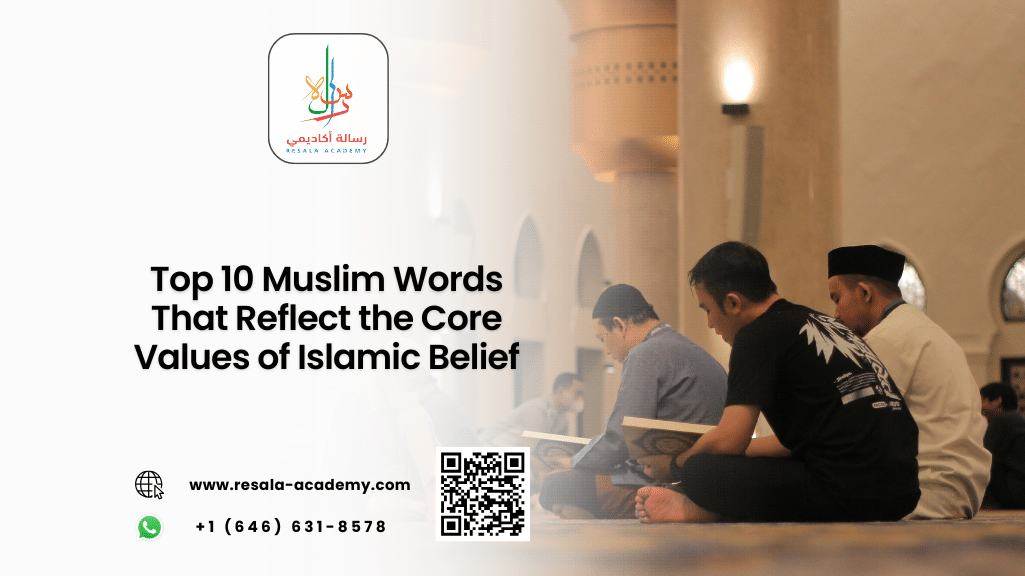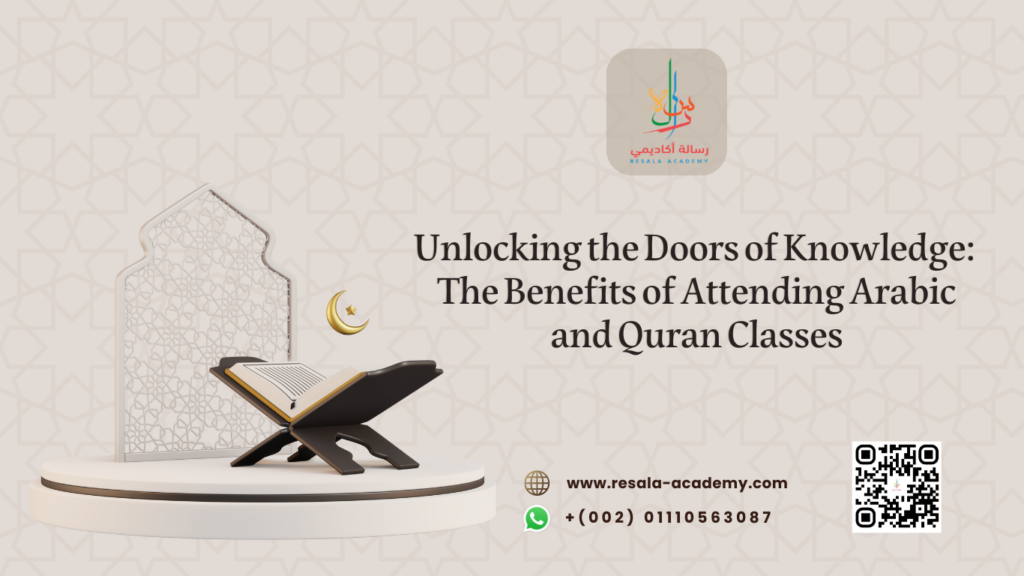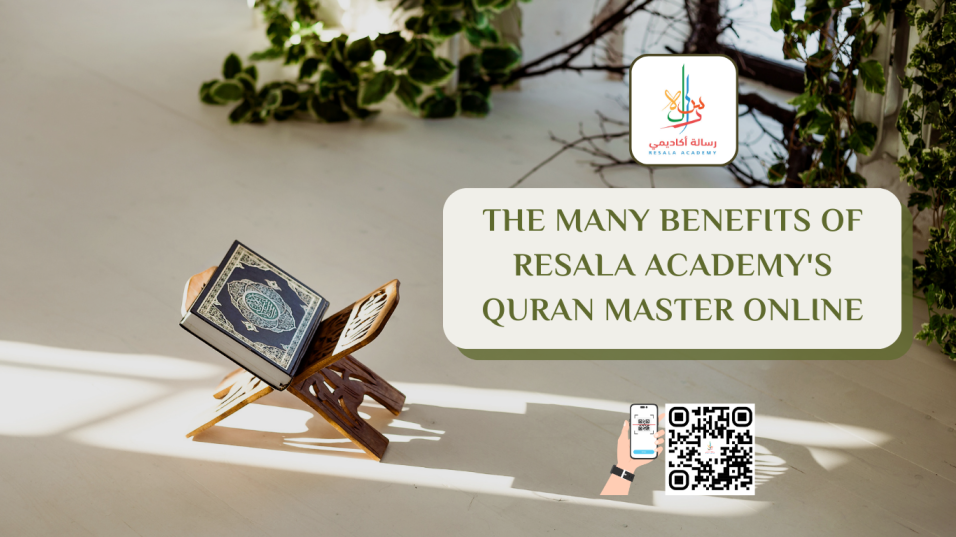Table of Contents
Top 10 Muslim Words That Reflect the Core Values of Islamic Belief
Islam is a religion deeply rooted in language, particularly the Arabic language. For non-native speakers, understanding key Muslim words can unlock a deeper appreciation of the faith, its practices, and its spiritual essence. These words are more than just vocabulary—they represent the foundational values and beliefs that shape the lives of over 1.9 billion Muslims around the world.
In this article, we will explore the top 10 most significant Muslim words that reflect the core values of Islamic belief. Whether you’re curious about Islamic culture, studying Arabic, or seeking to understand the Quran, this guide will enrich your journey. Throughout the article, we’ll also highlight how Resala Academy can help you master these essential terms and deepen your understanding of Islam.
Why Learning Muslim Words Matters
Muslim words are not just linguistic elements—they are spiritual symbols. Each term carries layers of meaning that connect to the Quran, the Sunnah (Prophetic tradition), and centuries of Islamic scholarship. For non-native speakers, learning these words is a gateway to:
- Understanding Islamic rituals and prayers
- Appreciating the depth of Quranic verses
- Engaging in meaningful conversations with Muslims
- Strengthening personal faith and spiritual growth
Let’s now explore the top 10 most powerful words in Muslim culture and belief.
1. ﷲ — Allah (God)
The most central word in Islam is undoubtedly Allah (الله), the Arabic word for God. It signifies the monotheistic essence of Islam—belief in one, all-powerful, and merciful Creator.
Quran Reference:
﴿هُوَ اللَّهُ الَّذِي لَا إِلَٰهَ إِلَّا هُوَ﴾
“He is Allah—there is no god ˹worthy of worship˺ except Him”
Surah Al-Hashr 59:22
Key Concepts:
- Tawheed (Oneness of God)
- Mercy and Justice
- Creator and Sustainer
2. إسلام — Islam (Submission)
The word Islam (إسلام) means “submission” or “surrender” to the will of Allah. It is both the name of the religion and a description of a believer’s relationship with God.
Quran Reference:
﴿إِنَّ الدِّينَ عِندَ اللَّهِ الْإِسْلَامُ﴾
“Certainly, Allah’s only Way is Islam.”
Surah Aal-Imran 3:19
Core Values:
- Obedience to divine guidance
- Peace through submission
- Spiritual discipline
3. مُسْلِم — Muslim (One Who Submits)
So, what does the word Muslim mean? A Muslim (مُسْلِم) is someone who submits to Allah. The term is derived from the same root as Islam (S-L-M), emphasizing peace and submission.
Quran Reference:
﴿وَمَنْ أَحْسَنُ قَوْلًا مِمَّن دَعَا إِلَى اللَّهِ وَعَمِلَ صَالِحًا وَقَالَ إِنَّنِي مِنَ الْمُسْلِمِينَ﴾
“And whose words are better than someone who calls ˹others˺ to Allah, does good, and says, “I am truly one of those who submit.”?”
Surah Fussilat 41:33
4. إيمان — Iman (Faith)
Iman (إيمان) refers to faith or belief in the unseen, including belief in Allah, angels, prophets, scriptures, the Day of Judgment, and divine decree.
Hadith Reference:
ثُمَّ قَالَ يَا مُحَمَّدُ مَا الإِيمَانُ قَالَ ” أَنْ تُؤْمِنَ بِاللَّهِ وَمَلاَئِكَتِهِ وَكُتُبِهِ وَرُسُلِهِ وَالْيَوْمِ الآخِرِ وَالْقَدَرِ خَيْرِهِ وَشَرِّهِ ” .
“Iman is to believe in Allah, His angels, His books, His messengers, the Last Day, and to believe in divine destiny, both good and bad.”
Jami` at-Tirmidhi 2610
Related Concepts:
- Yaqeen (Certainty)
- Tawakkul (Trust in God)
- Sabr (Patience)
5. صَلَاة — Salah (Prayer)
Salah (صلاة) is the formal Muslim prayer performed five times a day. It is a direct link between the believer and Allah.
Quran Reference:
﴿إِنَّ الصَّلَاةَ تَنْهَىٰ عَنِ الْفَحْشَاءِ وَالْمُنكَرِ﴾
“ndeed, ˹genuine˺ prayer should deter ˹one˺ from indecency and wickedness.”
Surah Al-Ankabut 29:45
Muslim Prayer Words in Arabic:
- Allahu Akbar (الله أكبر) – God is the Greatest
- Subhana Rabbiyal Azeem (سبحان ربي العظيم) – Glory is to my Lord, the Most Great
- Al-Fatiha – The Opening chapter of the Quran
6. قُرْآن — Quran (The Recitation)
The Quran (القرآن) is the holy book of Islam, revealed to Prophet Muhammad ﷺ over 23 years. It is the ultimate source of guidance for Muslims.
Quran Reference:
﴿ذَٰلِكَ الْكِتَابُ لَا رَيْبَ فِيهِ هُدًى لِّلْمُتَّقِينَ﴾
“This is the Book! There is no doubt about it1—a guide for those mindful ˹of Allah˺”
Surah Al-Baqarah 2:2
7. نَبِيّ — Nabi (Prophet)
A Nabi (نبي) is a prophet chosen by Allah to guide humanity. Muslims believe in all prophets, from Adam to Muhammad ﷺ, the final messenger.
Quran Reference:
﴿مَّا كَانَ مُحَمَّدٌ أَبَآ أَحَدٍۢ مِّن رِّجَالِكُمْ وَلَـٰكِن رَّسُولَ ٱللَّهِ وَخَاتَمَ ٱلنَّبِيِّـۧنَ ۗ وَكَانَ ٱللَّهُ بِكُلِّ شَىْءٍ عَلِيمًۭا ٤٠﴾
“Muḥammad is not the father of any of your men,1 but is the Messenger of Allah and the seal of the prophets. And Allah has ˹perfect˺ knowledge of all things.”
Surah Al-Ahzab 33:40
8. أُخُوَّة — Ukhuwwah (Brotherhood)
Ukhuwwah (أخوة) means brotherhood or sisterhood in faith. Islam emphasizes unity, compassion, and mutual support among believers.
Hadith Reference:
قَالَ رَسُولُ اللَّهِ صلى الله عليه وسلم “ تَرَى الْمُؤْمِنِينَ فِي تَرَاحُمِهِمْ وَتَوَادِّهِمْ وَتَعَاطُفِهِمْ كَمَثَلِ الْجَسَدِ إِذَا اشْتَكَى عُضْوًا تَدَاعَى لَهُ سَائِرُ جَسَدِهِ بِالسَّهَرِ وَالْحُمَّى ”.
Allah’s Messenger (ﷺ) said, “You see the believers as regards their being merciful among themselves and showing love among themselves and being kind, resembling one body, so that, if any part of the body is not well then the whole body shares the sleeplessness (insomnia) and fever with it.”
9. حَلَال — Halal (Permissible)
Halal (حلال) refers to what is lawful in Islam. It applies to food, behavior, business, and lifestyle choices.
Quran Reference:
﴿يَا أَيُّهَا النَّاسُ كُلُوا مِمَّا فِي الْأَرْضِ حَلَالًا طَيِّبًا﴾
“O humanity! Eat from what is lawful and good on the earth”
Surah Al-Baqarah 2:168
10. تَقْوَى — Taqwa (God-Consciousness)
Taqwa (تقوى) is the awareness of Allah in all aspects of life. It’s the moral compass that guides a Muslim’s actions.
Quran Reference:
﴿إِنَّ أَكْرَمَكُمْ عِندَ اللَّهِ أَتْقَاكُمْ﴾
“Surely the most noble of you in the sight of Allah is the most righteous among you.”
Surah Al-Hujurat 49:13
Can Muslims Say the N Word?
This is a sensitive and complex question. Islam strongly condemns racism in all forms. The Prophet Muhammad ﷺ said:
لا فضل لعربي على أعجمي، ولا لأبيض على أسود، ولا لأسود على أبيض إلا بالتقوى
“There is no superiority of an Arab over a non-Arab, nor a white over a black, except in piety.”
Musnad Ahmad, Hadith 118505
Using racial slurs, including the N-word, contradicts Islamic ethics of respect, dignity, and equality. Muslims are encouraged to use language that uplifts and unites.
Read more about: Surah Ikhlas with English Transliteration: Unlocking the Essence of Divine Oneness
Deep Linguistic Roots of Muslim Words in Classical Arabic
Understanding the etymology and morphology of key Muslim words reveals the profound structure and beauty of Classical Arabic—the language of the Quran. Each term is often derived from trilateral roots, which convey nuanced meanings and spiritual depth.
- Trilateral root system: Most words in Muslim theology stem from three-letter roots. For example, the word “Islam” comes from the root S-L-M, which also forms “Salam” (peace), “Muslim” (one who submits), and “Taslim” (greeting).
- Semantic layering: A single Arabic word can carry multiple meanings depending on context and vowelization. This makes Muslim prayer words like “Rahman” (الرحمن) and “Rahim” (الرحيم) deeply expressive of divine mercy.
- Quranic precision: The Quran uses specific word choices that reflect divine intent. For instance, the word “Hudan” (هُدًى – guidance) appears frequently to emphasize the Quran’s role as a moral compass.
- Phonetic spirituality: The rhythmic and phonetic qualities of Muslim words in Arabic enhance memorization and spiritual connection, especially during recitation in Salah (prayer).
- Cultural transmission: These sacred terms have influenced languages across the Muslim world, embedding Arabic-origin words into Persian, Urdu, Swahili, and even Spanish (e.g., “almohada” from “mikhaddah” – pillow).
Cognitive and Spiritual Benefits of Learning Muslim Words
For non-native speakers, learning Muslim words offers not only linguistic skills but also cognitive and spiritual enrichment. These benefits extend far beyond vocabulary acquisition.
- Enhanced memory and focus: Memorizing Muslim prayer words in Arabic activates both short-term and long-term memory, improving mental clarity and focus—especially when learning through structured programs like Resala Academy.
- Spiritual mindfulness: Understanding what you recite in prayer fosters a deeper emotional and spiritual connection with Allah, transforming routine rituals into conscious acts of devotion.
- Cross-cultural empathy: Learning what does the word Muslim mean and related concepts fosters intercultural understanding, breaking down stereotypes and building bridges between communities.
- Moral development: Words like “Taqwa” (God-consciousness), “Adl” (justice), and “Sabr” (patience) are not just linguistic items—they are ethical principles that shape character and behavior.
- Academic and career advantages: Proficiency in Quranic Arabic and Islamic terminology is a valuable asset for students, researchers, and professionals in fields like theology, linguistics, international relations, and Middle Eastern studies.
By diving deeper into the linguistic and spiritual dimensions of Muslim words, learners not only gain knowledge but also cultivate a holistic understanding of Islam’s timeless message.
Unlock the Language of the Divine with Resala Academy
If you’re a non-native speaker eager to learn Muslim prayer words in Arabic, understand the Quran, or explore Islamic culture, Resala Academy is your ideal partner. This leading online academy offers:
📖 Structured Arabic and Quran Hifz classes
🧑🏫 Native Arabic-speaking instructors
🕋 Courses tailored for all levels
🌍 Flexible online schedules
Whether you’re learning for personal growth, religious understanding, or academic goals, Resala Academy empowers you to connect with the heart of Islam—its language.
👉 Join Resala Academy today and begin your journey into the sacred words of Islam.
Frequently Asked Questions (FAQs)
1. What does the word Muslim mean?
A Muslim is someone who submits to the will of Allah. The term comes from the Arabic root “S-L-M,” which also gives us “Islam” (submission) and “Salam” (peace). A Muslim lives in accordance with divine guidance as revealed in the Quran and Sunnah.
2. What are the most common Muslim prayer words in Arabic?
Here are some essential Muslim prayer words in Arabic:
- Allahu Akbar – God is the Greatest
- Alhamdulillah – All praise is due to Allah
- SubhanAllah – Glory be to Allah
- Astaghfirullah – I seek forgiveness from Allah
- La ilaha illallah – There is no god but Allah
3. Can non-Muslims learn Muslim words?
Absolutely! Learning Muslim words helps non-Muslims understand Islamic culture, engage in interfaith dialogue, and appreciate the linguistic beauty of Arabic. Resala Academy offers beginner-friendly courses for non-native speakers.
4. Are all Muslim words in Arabic?
Most core Islamic terms are in Arabic, as the Quran and Hadith were revealed in this language. However, many words have been adopted into other languages used by Muslims globally, such as Urdu, Persian, and Malay.
5. How can I memorize Muslim words effectively?
Here are some tips:
- Enroll in structured courses like those at Resala Academy
- Use flashcards and spaced repetition apps
- Practice during daily prayers
- Listen to Quran recitations and repeat after them
- Join online study groups or forums
Conclusion
Understanding these top 10 Muslim words is more than a linguistic exercise—it’s a spiritual journey. Each term opens a window into the values of submission, faith, unity, and divine love that define Islam. Whether you’re a student of Arabic, a seeker of truth, or someone curious about Islamic culture, these words will guide you toward deeper insight.
And remember, the best way to truly internalize these concepts is through structured learning. Resala Academy stands as a beacon for non-native speakers, offering expert-led courses that bring the language of the Quran to life.
Start your journey today and let the sacred words of Islam transform your understanding, your heart, and your soul.




